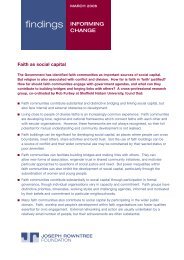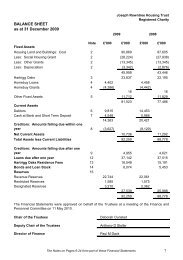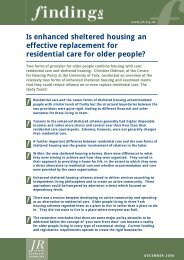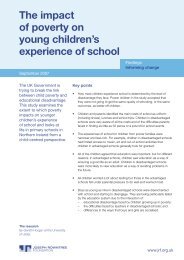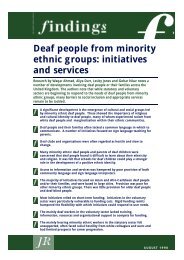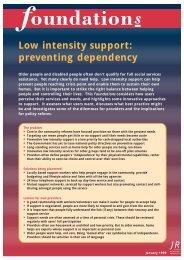Community participation - Joseph Rowntree Foundation
Community participation - Joseph Rowntree Foundation
Community participation - Joseph Rowntree Foundation
Create successful ePaper yourself
Turn your PDF publications into a flip-book with our unique Google optimized e-Paper software.
Putting the public back into public policy<br />
But there are good reasons to think that this is more than a temporary fad or a halfhearted<br />
attempt to find a new political narrative as voters’ patience with the pace of<br />
change in public services wears thin. All over the world, countries seem to be<br />
converging on community <strong>participation</strong> in governance as a solution to the challenges<br />
of twenty-first century public administration. Innovative ideas have emerged from<br />
every corner of the globe about how to involve local people in the decisions that<br />
affect their lives, from participatory budgeting in Porto Allegre, Brazil, to deliberative<br />
planning across villages in Kerala, India, to community councils in Lille, France, to<br />
the Citizens’ Assembly on Electoral Reform in British Columbia, Canada.<br />
The question is: why? What are we hoping community <strong>participation</strong> will achieve?<br />
Three reasons are put forward.<br />
1 It leads to better and more responsive public services: e.g. ‘Transferring<br />
ownership and accountability from Whitehall to the local community means that<br />
NHS foundation trusts are able to tailor their services to best meet the needs of<br />
the local population.’ 6<br />
2 It tackles people’s disengagement from politics and the democratic process: e.g.<br />
‘By enabling communities to help shape decisions on policies and services, we<br />
will support civil renewal and strengthen the legitimacy of the institutions of<br />
government.’ 7<br />
3 It builds social capital: e.g. ‘<strong>Community</strong> <strong>participation</strong> aims to increase the<br />
confidence and capacity of individuals and small groups to get involved in<br />
activities that improve their quality of life and build mutually supportive<br />
relationships that enhance neighbourliness and hold communities together.’ 8<br />
Our concern in this report is with the last of these claims. The question we seek to<br />
address is:<br />
Do policies to promote community <strong>participation</strong> in governance build social<br />
capital?<br />
The report is based on a review of the latest academic thinking and our own in-depth<br />
fieldwork in two of Britain’s most deprived housing estates: in Ely in western Cardiff;<br />
and in the Benchill area of Wythenshawe, south of Manchester.<br />
3



